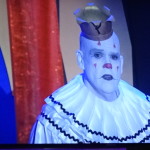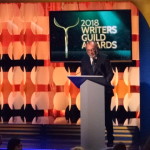Despite the serious subject matter of many of the projects in contention for the 2018 WGA Awards, with Patton Oswalt hosting for the third year running, a large thread of humor ran throughout the proceedings.
“Good evening, Disney employees,” Oswalt began as he took the podium at the Beverly Hilton’s International Ballroom for the untelevised—and therefore, uncensored–West Coast ceremonies on Feb. 11. (A concurrent WGA East kudofest was held in New York City and hosted by comic and writer Amber Ruffin.) “You are the least worst people in Hollywood. Who would guess that the actors and producers who yell at you all day turn out to be bad people? As Guillermo del Toro calls me, ‘the shape of pudding.’ I have 97 more hosting gigs here before we go to syndication. But maybe next year get a female host.”
Oswalt, who’s been doing standup for 20 years and currently stars in NBC’s “A.P. Bio” and Syfy’s “Happy!,” reminisced about the 2008 Writers Guild of America strike and how desperately producers needed content, which opened the television floodgates to even more reality programming, like “The Apprentice.”
“It began the unchecked ascent of Donald Trump. So next time you think President Theodore [Ted] Nugent, never fuck with writers again,” he warned. He also advised awards recipients to keep their acceptance speeches tight, or the theme from “Schindler’s List” would play them off. “If you go over 30 seconds, you’re anti-Semitic,” he said, as a violinist played the theme live.
Jordan Peele took the coveted original screenplay trophy for “Get Out,” while James Ivory won in the adapted category for “Call Me by Your Name,” making them both frontrunners in their respective screenwriting categories for the Academy Awards March 4.
Hulu’s “The Handmaid’s Tale” dominated the top television awards by winning two trophies, for drama and new series.
Fittingly, the “trophy girls,” who last year were dressed as Russian agents, this year wore the signature red robes and white bonnets of the dystopian handmaids.
For the third time in five years, HBO’s “Veep” was victorious for best comedy. HBO also scored a win for “Big Little Lies,” with David E. Kelley taking home the long form adaptation statuette.
“Flint” (Lifetime) pulled off a surprise win in long form adapted over FX’s “Feud.”
AMC’s “Better Call Saul” claimed the individual drama episode award, while NBC’s reboot of “Will & Grace” took the prize for individual comedy episode. The peacock network also scored with “Saturday Night Live,” which repeated in the variety sketch race and “Hollywood Game Night,” which won the quiz show prize again.
Other repeat winners: Netflix’s “Bojack Horseman” (Animation), ABC’s “General Hospital” (Daytime Drama) and HBO’s “Last Week Tonight with John Oliver” (Variety Talk).
The ceremony featured a number of well-known presenters including Glenn Close, Sir Patrick Stewart, Terry Crews, Minnie Driver, Alison Brie, Bradley Whitford, Wanda Sykes, Dylan McDermott, Sarah Silverman, Kathy Griffin, Rob Riggle and Washington Post editor Marty Baron.
 Jane Lynch narrated a segment commemorating the 70th anniversary of the Hollywood Blacklist, which destroyed the reputations of those accused of being communists by the House Un-American Activities Committee. She then introduced two survivors of the blacklist, Norma Barzman and Marsha Hunt, who received a prolonged standing ovation.
Jane Lynch narrated a segment commemorating the 70th anniversary of the Hollywood Blacklist, which destroyed the reputations of those accused of being communists by the House Un-American Activities Committee. She then introduced two survivors of the blacklist, Norma Barzman and Marsha Hunt, who received a prolonged standing ovation.
WGA West president David Goodman called out another luminary in the audience, Rep. Adam Schiff (D-Calif.), who has been front and center criticizing policies of the Trump administration. He also received a sustained ovation – twice, after having also been introduced by Oswalt, who yelled out, “Save us!”
And then there was Puddles Pity Party.
 The white-faced clown, a popular contestant last year on “America’s Got Talent,” belted out Eric Clapton’s “Tears in Heaven” for an In Memoriam segment, not for any scribes who had passed away during the past year but for movies that basically sucked and shows that got the ax. Among them, “Suburbicon,” “The Emoji Movie,” “The Mummy,” “Emerald City” and “Downward Dog.”
The white-faced clown, a popular contestant last year on “America’s Got Talent,” belted out Eric Clapton’s “Tears in Heaven” for an In Memoriam segment, not for any scribes who had passed away during the past year but for movies that basically sucked and shows that got the ax. Among them, “Suburbicon,” “The Emoji Movie,” “The Mummy,” “Emerald City” and “Downward Dog.”
The honorary awards are always a highlight at the WGA ceremonies. Dustin Lance Black, an Oscar and WGA Award winner for 2008’s “Milk,’ gave a moving speech upon receiving the Valentine Davies Award for his work fostering LGBTQ rights, specifically including the right to marry.
“The work we do is incredibly valuable and necessary work but it is not sufficient. We can’t stop here,” he said. “We need to find our intersections and beat back the powers of fear and repression. We have to rise up and resist and fight back against those trying to stop us. We are the best dreamers. Right now we need vision. The world needs visions of equality. There are lots of assholes out there who would have you believe that there is not enough equality to go around. We need to tell the world that when we get to a better place, there will still be enough equality for everyone.”
Alison Cross (“Serving in Silence: The Margarethe Cammermeyer Story,” “Roe vs. Wade,” “S.W.A.T.”) echoed some of those sentiments when she received the Paddy Chayefsky Laurel Award for Television Writing Achievement.
“Words carry the power to make a difference,” she said. “We need to keep fighting for the truth, word by word, every day. May our next pages be our best pages.”
The Paul Selvin Award was presented by WaPo editor Baron to “The Post” writers Liz Hannah and Josh Singer, whose screenplay embodies the spirit of constitutional and civil rights and liberties, including the First Amendment and freedom of the press.
“They delivered an inspirational story about a publisher who defied a president in the face of terrific risks,” he said. “We need to stand up to intimidation from the most powerful person on earth. The First Amendment is a call to action, but the right is meaningless if not exercised. Katherine Graham endures as a model for women—and men– proving that we will do the right thing more often if we listen better.”
“We were writing about the past to speak to the present, about the brave journalists at the New York Times and the Washington Post who stood up to power,” said Hannah, who wrote the script on spec and then collaborated with Singer, who had written another film about journalists, 2015’s “Spotlight,” which earned him an Oscar for best original screenplay. “Every day now, the truth is under assault and we must combat bigotry, racism and sexism. We have a responsibility to speak up. It starts with writers.”
 Doug Wick and Lucy Fisher presented the WGAW’s Laurel Award for Screenwriting Achievement to Writers Guild and Academy Award-winning screenwriter-director-producer James L. Brooks (“Terms of Endearment,” “Broadcast News,” “As Good As It Gets”). They said his films make you want to laugh and cry – and see them again.
Doug Wick and Lucy Fisher presented the WGAW’s Laurel Award for Screenwriting Achievement to Writers Guild and Academy Award-winning screenwriter-director-producer James L. Brooks (“Terms of Endearment,” “Broadcast News,” “As Good As It Gets”). They said his films make you want to laugh and cry – and see them again.
“It took me years to get to the point where I could say I’m a writer,” Brooks admitted in his acceptance speech, saying he sometimes felt like a fraud. “Some days everything seems too good to be true. But on the bad days a demon shows up. It’s common that people say it’s difficult to live with a writer. But I think omnipotence and self-loathing sounds like fun.”


